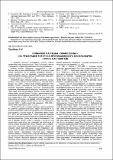| dc.contributor.author | Грибова, Светлана Владимировна | |
| dc.coverage.spatial | Брест | |
| dc.date.accessioned | 2021-04-21T11:01:37Z | |
| dc.date.available | 2021-04-21T11:01:37Z | |
| dc.date.issued | 2016 | |
| dc.identifier.citation | Грыбава, С. У. Польская палітыка «Праметэізму» (на прыкладзе татарска-мусульманскага насельніцтва ІІ Рэчы Паспалітай) / С. У. Грыбава // Вестник Брестского государственного технического университета. Серия: Гуманитарные науки. – 2016. – № 6. – С. 15–16. | |
| dc.identifier.uri | https://rep.bstu.by/handle/data/15811 | |
| dc.description | GRIBOVA S.V. The Polish policy of «Prometheism» (in terms of the Tatar-Muslim population of the Second Polish Republic) | |
| dc.description.abstract | У дадзеным артыкуле раскрываецца сутнасць палітыкі «Праметэізму», якую праводзілі польскія ўлады ў міжваенны перыяд, адзначаецца яе ўплыў на фарміраванне ў асяроддзі польскай татарскай эліты ідэалогіі панісламізму, панцюркізму і татарскага нацыяналізму, што, ў сваю чаргу, прывяло да таго, што частка татарскай эліты заходніх рэгіёнаў Беларусі ў гады Вялікай Айчыннай вайны імкнулася рэалізаваць свае нацыяналістычныя ідэі, супрацоўнічаючы з германскімі акупацыйнымі ўладамі. Звяртаецца ўвага на дзейнасць Эдыгея Шынкевіча (пляменніка Якуба Шынкевіча, які быў зацверджаны на пасаду муфція «Остланда») у накірунку распаўсюджвання ідэй дадзенага кшталту, а таксама на дзейнасць Вялікага муфція Іерусалімскага Аль-Хусейні, які імкнуўся да супрацоўніцтва з германскімі ўладамі і быў прызначаны нямецка-фашысцкімі захопнікамі «правадыром» усіх мусульман Вялікай Германіі. | |
| dc.language.iso | be | |
| dc.publisher | БрГТУ | |
| dc.title | Польская палітыка «Праметэізму» (на прыкладзе татарска-мусульманскага насельніцтва ІІ Рэчы Паспалітай) | |
| dc.type | Статья (Article) | |
| dc.identifier.udc | 327(438):94|1918/1939| | |
| dc.abstract.alternative | In this article the policy essence to Prometheism which was carried out by the Polish authorities to an inter war period reveals, its influence on forming in the environment of the Polish Tatar elite of ideology to Pan-Islamism, a pantsyurkizm and the Tatar nationalism is noted that in turn, led to the fact that a part of the Tatar elite of the western regions of Belarus in days of the Great Patriotic War aimed to realize the nationalist ideas, cooperating with the German occupational authorities. The attention to Edygey Shinkevich's activities is paid (the nephew Yaqub Shinkevich who was approved to a position of the mufti of Ostland) in the direction of distribution of the ideas of this sort, and also to activities of the Great mufti Jerusalem Al-Hussein who aimed at a cooperation with the German authorities and it was appointed German - fashystsky aggressors "leader" of all Muslims of Great Germany. | |
